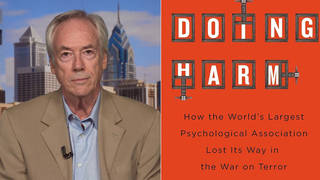
The American Psychological Association has officially notified the U.S. government of its new policy barring psychologists from participating in national security interrogations. The new rules were approved in August after an independent investigation documented how the APA leadership actively colluded with the Pentagon and the CIA torture programs. In a new letter to the White House and top federal officials, the APA asks the government to withdraw psychologists from any interrogation or prison setting that could put them in violation of the new ethics policy. We get reaction from Widney Brown, director of programs at Physicians for Human Rights, who says the changes are key to protecting health professionals from military prosecution “when they stand by those ethical codes of conduct and refuse to engage in what is patently unlawful behavior.”
Transcript
JUAN GONZÁLEZ: And I’d like to ask you also, in terms of torture, about the psychologists and torture. The American Psychological Association has officially notified the U.S. government of its new policy barring psychologists from participation in national security interrogations. The new rules were approved in August after an independent investigation documented how the APA leadership actively colluded with the Pentagon and the CIA torture programs.
AMY GOODMAN: In a new letter to the White House and top federal officials, the APA asks the government to withdraw psychologists from any interrogation or prison setting that could put them in violation of the new ethics policy. The letter also urges officials to grant detainees their rights under federal and international law. Explain the significance of this, Widney Brown.
WIDNEY BROWN: Well, the CIA turned to the American Psychological Association to get a psychologist to basically endorse what was euphemistically called “enhanced interrogation techniques”—two psychologists we know of, Mitchell and Jessen, who the ACLU actually has now filed a civil suit against. The APA then had a panel that altered its ethics structure such that psychologists could participate in these interrogations—basically, colluding in torture. The American Medical Association prohibits that. The American Psychiatric Association prohibits that. But the American Psychological Association actually reduced its ethical standards. So this vote restoring the standards is critically important, and the withdrawing of psychologists from any interrogation of national security detainees or any interrogation of anyone being held in unlawful detention circumstances is a very important step forward.
JUAN GONZÁLEZ: But what practical effect would it have in terms of actual individual psychologists refusing to do that, to refusing to participate? In other words, what would be the sanctions imposed upon them if they did?
WIDNEY BROWN: Well, the American Psychological Association has its own ethical board, so if a psychologist did go forward with that, they could be challenged, including possibly losing their license. Our concern has more been, if you think back to the Navy nurse who refused to participate in force-feeding in Guantánamo Bay, he was threatened with a court-martial. We can’t have the military going after health professionals, who have ethical codes, when they stand by those ethical codes of conduct and refuse to engage in what is patently unlawful behavior.
AMY GOODMAN: Widney Brown, we want to thank you very much for being with us, director of programs at Physicians for Human Rights.
When we come back, we’re switching gears. We’re going to be talking about How the Other Half Banks: Exclusion, Exploitation, and the Threat to Democracy. Stay with us.













Media Options